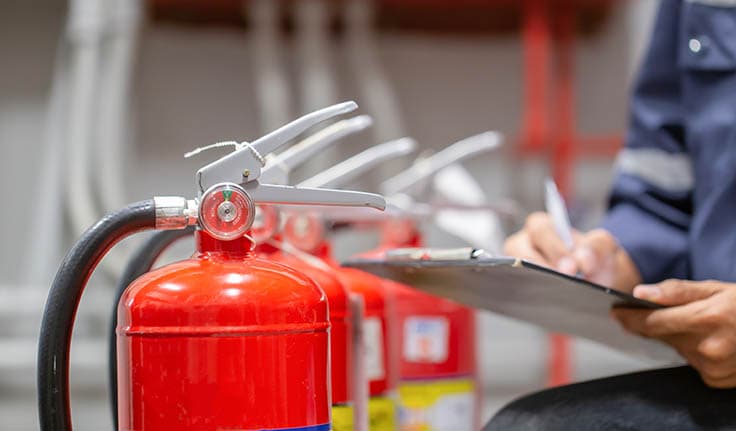Hurricane season is almost here. Help prepare for it with these tips to help you create a checklist for hurricane preparedness for your home and family.
May 4th through the 10th is Hurricane Preparedness Week 2025 from the U.S. National Oceanic and Atmospheric Administration. As hurricane season approaches, it's important for homeowners to take proactive steps to help safeguard their homes and families. Hurricanes can cause significant damage, but with proper preparation, you can help minimize the risks. Here are some tips to help you get started with your own checklist for hurricane preparedness.
8 Helpful Hurricane Preparedness Tips for Hurricane Preparedness Week 2025
1. Understand Hurricane Categories
Before diving into these tips to help you make a checklist for hurricane preparedness, familiarize yourselves with the Saffir-Simpson Hurricane Wind Scale, which categorizes hurricanes from Category 1 to Category 5 based on their sustained wind speeds and potential for damage. Understanding the potential impact based on category can help you when you are keeping an eye on weather reports and prioritizing your preparations when a hurricane is predicted.
Here is a basic description of the categories:
- Category 1: 74-95 mph winds – Some damage
- Category 2: 96-110 mph winds – Extensive damage
- Category 3: 111-129 mph winds – Devastating damage
- Category 4: 130-156 mph winds – Catastrophic damage
- Category 5: 157+ mph winds – Catastrophic damage
2. Create an Emergency Plan
Developing a clear and detailed emergency plan can be crucial part of your checklist for hurricane preparedness. Here are a few components to consider including in your plan:
- Communication Plan: Establish a communication plan with your family members. Ensure everyone knows how to contact each other and where to meet if separated.
- Evacuation Routes: Identify multiple evacuation routes from your home. Practice these routes with your family to ensure everyone is familiar with them.
- Emergency Contacts: Keep a list of emergency contacts, including local authorities, nearby hospitals, and family members.
3. Assemble an Emergency Kit
Emergency kits typically contain essentials to support your family for at least 72 hours. Make sure everyone knows where it is kept. Here are some ideas on what to include:
- Water: One gallon per person per day for at least three days (per CDC guidelines).
- Food: Non-perishable items that can last for at least three days.
- First-Aid Kit: Include necessary medications and basic medical supplies.
- Tools and Supplies: Flashlights, batteries, multi-tools, and a manual can opener.
- Personal Items: Important documents in a waterproof container, cash, and personal hygiene items.
- Clothing and Bedding: Extra clothes, blankets, and sleeping bags.
- Communication Devices: A portable, battery-powered or crank radio to stay updated on the storm's progress and pre-charged device chargers.
4. Secure Your Home
It's essential to consider the strength of your home to withstand hurricane-force winds and rain. Here are some tips to consider:
- Windows and Doors: Install storm shutters or plywood covers. Reinforce doors with heavy-duty hardware.
- Roof and Gutters: Inspect and repair any loose shingles. Clean gutters to help prevent water buildup and ensure proper drainage.
- Landscaping: Trim trees and bushes to minimize the risk of flying debris. Secure outdoor furniture, decorations, and tools.
- Sump Pumps and Drains: Ensure sump pumps are working correctly. Clear out any debris from drains to help prevent flooding.
Consider consulting with contractors who can evaluate your home for readiness.
5. Document Your Property
Before a hurricane strikes, document your property for insurance purposes. It could prove to be an important part of your checklist for hurricane preparedness. Here are two ways to complete that documentation:
- Photographs and Videos: Capture the condition of your home's interior and exterior. Focus on valuable items or areas that may be prone to damage.
- Inventory List: Create a list of your possessions, noting their value (receipts or appraisals help).
6. Stay Informed
Staying informed throughout hurricane season can help save lives. Here are some ways to keep up-to-date:
- Weather Alerts: Sign up for local emergency alerts and warnings. Follow reliable sources such as the National Weather Service.
- Evacuation Orders: Pay attention to local authorities and follow their instructions, especially if there are evacuation orders.
- Stay Connected: Have multiple ways to receive updates. This includes smartphones, radios, and internet access.
- Check Out Acrisure's Hurricane Resources Page: Bookmark Acrisure's hurricane resources page, which could be very helpful in the event you need to make an insurance claim.
7. Familiarize Yourself with Post-Storm Safety
Your actions post-storm can be just as important as preparations. Consider:
- Follow Safety Announcements: Only return home once authorities have declared it safe.
- Inspect for Damage: Carefully inspect your property for structural damage, gas leaks, or electrical issues. If unsure about safety, consult professionals.
- Document Damage: Take photographs for insurance claims and make temporary repairs to prevent further damage.
- Seek Assistance: If your home is severely damaged, seek aid from local relief organizations or government agencies.
8. Review and Update Insurance
Ensure your homeowners insurance is current and sufficiently covers hurricane damage to your home and that your flood insurance sufficiently covers flooding due to hurricanes. Check your auto insurance policy to ensure you have the right coverage. Flood damage to cars is typically covered under the comprehensive coverage portion of an auto insurance policy. Consider these tips:
- Policy Review: Regularly review your insurance policies to understand what's covered and identify any gaps.
- Contact Information: Keep your insurance company's contact information handy for quick communication post-storm.
Remember, preparation not only helps protect your property but also your family's safety.
In Conclusion
By following these tips, you can prepare a checklist for hurricane preparedness. Remember, preparation not only helps protect your property but also your family's safety. Note that the information provided above is for general informational purposes only and is not intended to be professional advice. Always consult local authorities, emergency management agencies and licensed professionals for guidance specific to your area and situation.
If you're looking for the right homeowners insurance, flood insurance or auto insurance for your needs, Acrisure can help. Contact us or request a home, flood, or auto insurance quote to get started. We can also help you bundle your insurance policies to take advantage of potential benefits.







